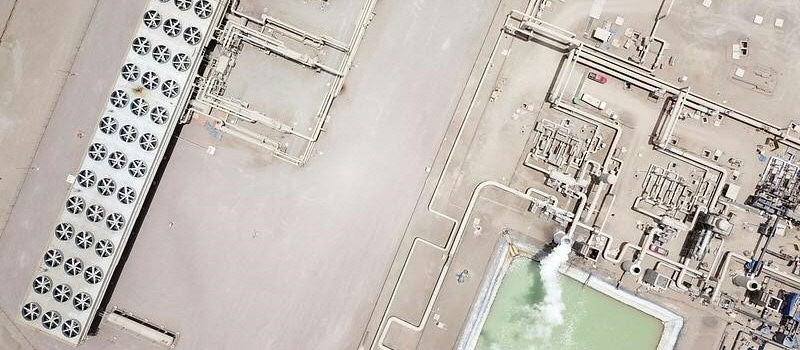Multiple Lives of Subsurface in Decarbonization

The global imperative for decarbonization and energy transition is increasingly framed as a shift towards global land scramble, given the spatially extensive nature of renewables and the divergent land-use patterns these technologies impose. Urgency and intensity of the transformation in the energy sector also has significant implications for the socio-material reconfiguration of subsurface spaces given that the power relations and institutional structures that manage these subterranean spaces are constantly shifting. This summer school, organized in collaboration with HARNESS Project, will dive into the politics of sub/surface spaces in the energy transition with attention to spatialities, materialities and temporalities of subterranean renewable energy (ie. Geothermal), carbon-capture & storage (CCS), nuclear waste storage, and hydrogen storage technologies. We will bring together expertise from political ecology, science and technology studies (STS), environmental sciences, critical geography, geosciences, and anthropology to dive into the key concepts and theories on the politics of the subterranean in energy transition.
The key objectives of this summer school are to:
-
Initiate an international research cooperation on the role of subterranean spaces in energy transition with a focus on geothermal energy, CCS (carbon capture and storage) and beyond
-
Creating learning and networking opportunities for graduate students in energy social science
-
Innovate and experiment with educational formats
Practical information
|
Dates & location
|
28 August 2024 - 30 August 2024
Groningen, the Netherlands |
|
Level
|
Primarily PhD and early career researchers, advanced MA students applications will also be considered.
|
|
Fee
|
Summer school fee covers the course material, welcome drinks, coffee breaks, lunch and a farewell dinner. This summer school is co-financed by HARNESS Project (Promises, pitfalls and spatialization of geothermal energy as a decarbonization strategy, running between 2020-2023) funded by FORMAS Swedish Research Council for Sustainable Development (Project no: 2020-00825). There are 5 tuition waivers grants available for researchers from the global South. Please mention in your motivation letter how and why you qualify for a tuition waiver.
Note that travel and accomodation expenses need to be covered by the applicants or their institutions.
|
|
Academic coordinators
|
Dr. Ethemcan Turhan |
|
Contact
|
subsurface-summerschool rug.nl |
Requirements
Participants should hold at least a master degree (or be close to finishing this degree) and show affinity to or interest in engaging with energy transition and subterranean spaces.
It is expected that the participants have a sufficient command of the English language to actively participate in the discussions and to present their own work in English.
Learning outcomes
After this course you will be able to:
- Develop informed arguments on the socio-spatial conflicts around subsurface decarbonization policies
- Formulate new research questions on the verticality of energy transition and contribute to the scholarly debates
- Identify and engage with the relevant societal actors of subsurface energy transition
Course schedule
The summer school will feature multiple formats:
-
Physical lectures
-
Round tables
-
Debates
-
City tour/site visits
-
Social events
More information will be available here soon.
Introduction to Lecturers

Dr. Ethemcan Turhan
Dr. Ethemcan Turhan is an assistant professor at the Department of Spatial Planning and Environment, University of Groningen. He was previously a postdoctoral researcher at KTH Environmental Humanities Laboratory, Sweden between 2016 and 2020. His research and teaching interests are situated at the broadly defined field of political ecology with empirical attention to climate justice and energy democracy. He has published widely on environmental conflicts around energy infrastructures, climate mobilities and climate policy. He is the project leader of the project, HARNESS (Harnessing the heat below our feet: Promises, pitfalls and spatialization of geothermal energy as a decarbonization strategy), running between 2021-2023 and funded by Swedish Research Council (FORMAS).

Dr. Rozanne C. Spijkerboer
Dr. Rozanne C. Spijkerboer is a postdoctoral researcher in energy planning at the Department of Spatial Planning and Environment, University of Groningen. Her PhD research focused on integrated energy planning and marine spatial planning with empirical attention to offshore wind energy projects. Her works appeared in scientific journal such as Environmental Innovation and Societal Transitions, Energy Research and Social Science and Frontiers in Marine Science among others.

Dr. Johannes Miocic
Dr. Johannes Miocic is assistant professor for geo-energy at the Energy and Sustainability Research Institute Groningen, University of Groningen. He was previously assistant professor for sedimentology and quaternary research at the University of Freiburg, Germany. His research is focused on the utilization of the subsurface in sustainable energy systems, including the safety of subsurface CO2 and hydrogen storage. He also works on improving the understanding of the Groningen gas field, where hydrocarbon extraction has led to reservoir compaction and induced seismicity. He has published widely on the role of secure subsurface storage in the energy transition and was currently lead editor of a Special Publication with the Geological Society of London entitled “Enabling secure subsurface storage in Future Energy Systems”.

Dr. Alevgül Sorman
Dr. Alevgül Sorman is an Ikerbasque Research Associate at the Basque Centre for Climate Change (BC3), Spain. Her research scrutinizes energy transitions with insights from human geography, political ecology and ecological and biophysical economics. Her publications have contributed to debates on territorial implications of renewable energy expansions, the role of participation and gender-sensitive representations within energy decision-making mechanisms, and synergies across environmental and labour organisations, with co-creation at the heart of her research. She has previously been a visiting researcher at the Pufendorf Institute for Advanced Studies (Sweden), Universidad Federal do Rio de Janeiro (Brazil), Instituto de Altos Estudios (Ecuador) and the Italian National Institute for Statistics (Italy).

Dr. Sofía Vargas-Payera
Sofía Vargas-Payera is a social researcher at the Space and Planetary Exploration Laboratory, University of Chile. She received her Ph.D. from the Transdisciplinarity lab at ETH, Zürich (Switzerland) and her M.A. in risk communication from Siman Fraser University (Canada). For the last seven years she has been working on understanding social and cultural aspects of geothermal energy in Andean context, focusing on Chile. As a member of Women in Geothermal (WING) and Energy Poverty Network (RedPe), she has integrated gender and energy justice approaches in her research and applied projects. She also has published books for children about subsurface elements such as geothermal energy and groundwater.
Application procedure
To apply, kindly fill out the online application form. Please include the following documents with your application:
-
Short CV (max. 2 pages)
-
Letter of motivation, explaining what you hope to learn during the summer school and why this will be important for your academic ambitions (max. 1 page)
-
Title/Abstract of a research presentation (max. 300 words)
Please send your motivation letter and abstract in a single pdf file.
Application deadline: 10 June 2024



